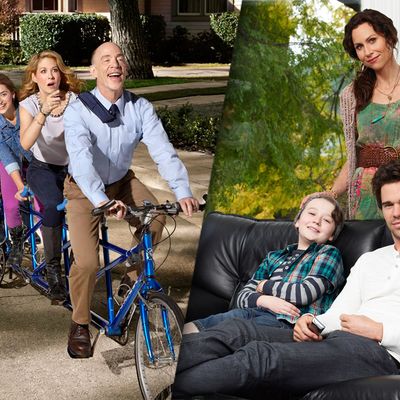
Most sitcoms are populated either by characters youÔÇÖd meet in life or characters that only exist on sitcoms. Two new NBC sitcoms, Growing Up Fisher and About a Boy, fall into the second category. ThatÔÇÖs not to say theyÔÇÖre incompetent or otherwise unwatchable; theyÔÇÖre professional bits of work, acted and written and directed with energy. They might catch on with audiences or they might not, and they might improve drastically or they might not. Whatever happens, IÔÇÖm in no rush to watch either show again, because IÔÇÖm tired of sitcoms in which everybody acts and sounds like a network sitcom character, talking very quickly and in a peppy and ÔÇ£brightÔÇØ tone to make you think they arenÔÇÖt irritating, even outright horrible people.
About a Boy ÔÇö┬ábased loosely on Nick HornbyÔÇÖs novel and the same-named Hugh Grant film adaptation ÔÇö is about one such horrible person, a smarmy compulsive womanizer named Will Freeman (David Walton, star of many sitcoms that for whatever reason didnÔÇÖt last long) who moves in next door to a single mom named Fiona Brewer (Minnie Driver) and her cute son Marcus (Benjamin Stockham). By cute I mean ÔÇ£cute,ÔÇØ and by ÔÇ£cuteÔÇØ I mean ÔÇ£TV cute,ÔÇØ which translates as, ÔÇ£is theoretically a sweet elementary schooler, but talks like an emotionally arrested adult man whoÔÇÖs taking an improv class in L.A.ÔÇØ The first three episodes are all variations on the same formula: Selfish bastard Will somehow ends up squiring the kid around in ÔÇ£adultÔÇØ circumstances (such as a flashy record industry pool party thronged by gyrating babes) and getting him into deeply mortifying trouble and then apologizing to the kid/his mother/tacitly to the viewer, but being let off the hook, sort of, because heÔÇÖs helping loosen up the kid, whose mother is raising him as a gluten-free, lactose-intolerant vegetarian and otherwise refusing to let him have any fun, man, and dear God, no, just no.
I seem to recall that this same character was more tolerable in the Hugh Grant film version, probably because he was played by Hugh Grant; at least he didnÔÇÖt act like a manipulative drug addict who keeps getting his friends into terribly compromised positions and then skates away from real consequences by being off-the-cuff funny and bagging hot babes. To be clear, the problem isnÔÇÖt that Will is in some general sense unlikable, itÔÇÖs that About a Boy rigs the show so that you have no choice but to think of him as a liberating life force whoÔÇÖs adorable and ultimately admirable. Don Draper, Will ainÔÇÖt. However well-executed, shows like this one and FoxÔÇÖs Rake are propaganda on behalf of douchebags.
Growing Up Fisher, about a blind lawyer┬áis much better, in the sense that it does not make you want to pull your own eyeballs out in protest. But thereÔÇÖs something fundamentally false about it as well. J.K. Simmons plays Mel, a blind lawyer who has successfully hidden his blindness from most of his clients with help from friends and family, including his son┬áHenry (Eli Baker), whom he uses as, essentially, a sight beard. ThereÔÇÖs much in the series thatÔÇÖs simply puzzling ÔÇö or maybe evidence that the creators succumbed to network notes demanding that every character be more ÔÇ£likableÔÇØ ÔÇö such as the fact that Mel and his wife Joyce (Jenna Elfman) just got divorced even though thereÔÇÖs no apparent reason why theyÔÇÖd even dislike each other.
The series is drawn from the life of creator D.J. Nash, and narrated in past tense by Jason Bateman (even though itÔÇÖs set in the present), so IÔÇÖm reluctant to call anything out as purely unbelievable, because the reply might be ÔÇ£but it actually happened!ÔÇØ Suffice to say thereÔÇÖs not enough explanation for such details as the husband being forbidden to bring a seeing-eye dog into the house because of his wifeÔÇÖs dog allergy (would this issue not have been addressed in their early courtship ÔÇö and if it was, why wasnÔÇÖt it resolved by their resolving to date other people?). And some other details are handled so awkwardly that they feel like attempts to explain away production or casting issues; the worst of these is JoyceÔÇÖs story about meeting her pushing-retirement-age husband and having her first child (teenage daughter Ava Deluca-Verley) when she was barely out of high school, which adds a bit of unexplained cradle-robbing creepiness to whatÔÇÖs otherwise a perfectly affable relationship. The creative failure of Growing Up Fisher is more distressing than the missteps of About a Boy because there would seem to be so much more potential there. These are characters that, in theory, you havenÔÇÖt seen before, but the show makes them feel too┬áfamiliar.


